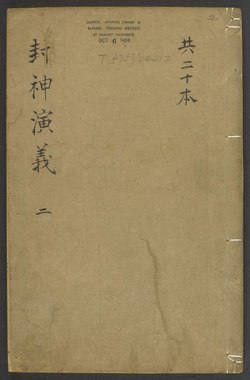 Cover of the Investiture of the Gods, book two, from the Harvard University's rare books collection | |
| Author | Xu Zhonglin Lu Xixing |
|---|---|
| Original title | 封神演義 |
| Language | Chinese |
| Genre | Chinese mythology, shenmo, fantasy, historical fiction |
Publication date | 16th century |
| Publication place | China |
| Media type | |
| Investiture of the Gods | |||||||||||||
|---|---|---|---|---|---|---|---|---|---|---|---|---|---|
| Traditional Chinese | 封神演義 | ||||||||||||
| Simplified Chinese | 封神演义 | ||||||||||||
| Literal meaning | The Romance of the Investiture of the Gods | ||||||||||||
| |||||||||||||
| Alternative Chinese name | |||||||||||||
| Traditional Chinese | 封神榜 | ||||||||||||
| Simplified Chinese | 封神榜 | ||||||||||||
| Literal meaning | The Name List of the Investiture of the Gods | ||||||||||||
| |||||||||||||
The Investiture of the Gods, also known by its Chinese names Fengshen Yanyi (Chinese: 封神演義; pinyin: Fēngshén Yǎnyì; Wade–Giles: Fêng1-shên2 Yan3-yi4; Jyutping: Fung1 San4 Jin2 Ji6) and Fengshen Bang (封神榜),[note 1] is a 16th-century Chinese novel and one of the major vernacular Chinese works in the gods and demons (shenmo) genre written during the Ming dynasty (1368–1644).[2] Consisting of 100 chapters, it was first published in book form between 1567 and 1619.[2] Another source claims it was published in a finalized edition in 1605.[3] The work combines elements of history, folklore, mythology, legends and fantasy.[4]
The story is set in the era of the decline of the Shang dynasty (1600–1046 BC) and the rise of the Zhou dynasty (1046–256 BC). It intertwines numerous elements of Chinese mythology, Chinese folk religion, Chinese Buddhism, Confucianism, and Taoism, including deities, demons, immortals and spirits. The authorship is attributed to Xu Zhonglin.
- ^ Lu Xun (1959), p. 230.
- ^ a b Haase, Donald (2008). The Greenwood Encyclopedia of Folktales and Fairy Tales: A-F. Greenwood Publishing Group. p. 340. ISBN 978-0-313-33442-9.
- ^ Chang, Kang-i Sun (2010). The Cambridge History of Chinese Literature Volume II: From 1375.
- ^ Chew, Katherine Liang (2002). Tales of the Teahouse Retold: Investiture of the Gods. Page XI. ISBN 0-595-65161-5.
Cite error: There are <ref group=note> tags on this page, but the references will not show without a {{reflist|group=note}} template (see the help page).